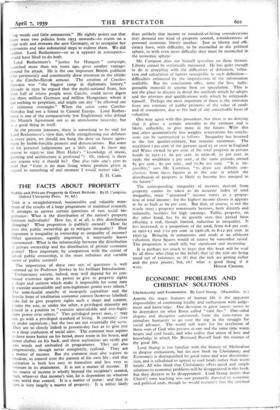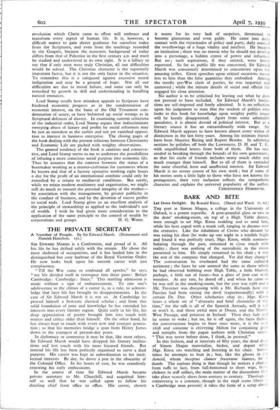ECONOMIC PROBLEMS AND CHRISTIAN SOLUTIONS
Christianity and Economics. By Lord Stamp. (Macmillan. 5s.) AMONG the tragic features of human life is the apparent impossibility of combining loyalty and enthusiasm with judge- ment and know:edge. Our devotion to great causes seems to be dependent on what Ibsen called " vital lies." One-sided slogans and deceptive catchwords form the rum-ration to stimulate humanity to go over the top in the struggle for social advance. The world still waits for the revelation of those sons of God who possess at one and the same time warm hearts and cool heads, and who realise that union of love and knowledge in which Mr. Bertrand Russell finds the essence of the good life.
Lord Stamp is too familiar with the history of Methodism to despise enthusiasm, but his new book on Christianity and &onamics is distinguished by good sense and wise discrimina- tion, and is calculated to appeal to cool heads rather than warm hearts. All who think that Christianity offers quick and simple solutions to economic problems will be disappointed in this book, but they deserve to be disappointed. Lord Stamp insists that Christ's own teaching was not primarily directed to economic and political ends, though he would recognise that the spiritual revolution which Christ came to effect will embrace and transform every aspect of human life. It is, however, a difficult matter to gain direct guidance for ourselves today from the Scriptures, and even from the teachings recorded in the Gospels, because the economic background of today differs from that of Palestine in the first century a.n. and must be studied and understood in its own right. It is a fallacy to say that if only men were truly Christian, all our difficulties would be solved. The Christian character is the supremely important factor, but it is not the only factor in the situation. To remember this is a safeguard against excessive moral indignation and may be a ground of hope. Not all our difficulties are due to moral failure, and some can only be remedied by growth in skill and understanding in handling natural resources.
Lord Stamp recalls how mistaken appeals to Scripture have hindered economic progress as in the condemnation of economic interest, on the basis of the Old Testament con- demnation of usury, or have bolstered up social wrongs as in Scriptural defences of slavery. In examining current criticisms of the industrial order, Lord Stamp argues that indiscriminate sweeping abuse of luxury and profits by social reformers may be just as mistaken as the earlier and not yet vanished opposi- tion to interest in business enterprise. The closing pages of the book dealing with the present relations between Christianity and Economic Life are packed with weighty observations.
The general tendency of the book is cautious and conserva- tive, and Lord Stamp seems to me to underrate the possibilities of infusing a more conscious social purpose into economic life. Thus he assumes that the contrast between the status of a bootmaker working as a master-craftsman for customers whom he knows and that of a factory operative working eight hours a day for the profit of an international combine could only be remedied by a return to mediaeval conditions. But surely, while we retain modern machinery and organisation, we might still do much to reassert the personal integrity of the worker— by association with the management, by greater publicity in the conduct of business, and by the devotion of excess profits to social ends. Lord Stamp gives us an excellent analysis of the principle of stewardship as applied to the individual's use of wealth. I wish he had given more consideration to the application of the same principle to the control of wealth by
corporations and groups. H. G. WOOD.











































 Previous page
Previous page